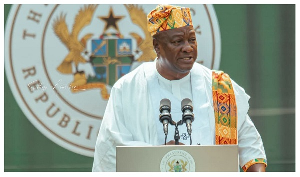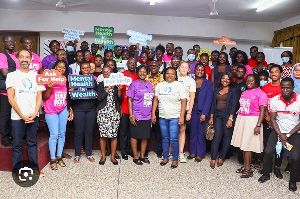Accra, April 21, GNA - The Ghana National Education Campaign Coalition (GNECC) on Thursday called on the government to make education really free by abolishing all levies, taxes and barriers to education. It also called on the government to intensify its own efforts to achieve gender parity in the near future and education for all by the year 2015.
Mrs Juliana Adu-Gyamfi, Chairperson of the Interim Management Council of GNECC, who was speaking at this year's launch of Global Action Week on Education, said anything that would keep the child out of school should be removed or paid for by government to ensure that all Ghanaian children were kept in the classroom.
The weeklong programme was under the theme "Education to End Poverty". Global Campaign on Education (GCE), UNESCO, Action Aid International Ghana and Ghana Education Service sponsored it. The Global Action Week is an international activity to make education a public concern spearheaded by GCE.
The GNECC, a member of GCE, exists as a coalition of NGOs and Civil Society Organizations interested in ensuring that every Ghanaian child has access to not just education but a good and enjoyable basic education for children and adults especially women
Mrs Adu-Gyamfi said five years ago, world leaders agreed a set of Millennium Development Goals for eradicating poverty, including getting equal numbers of girls as boys into the classroom by 2005 and achieve universal completion of primary education by 2015.
This year marks the year for achieving the Gender Parity Goal of the Millennium Development Goals (MDGs) but Ghana is one of the 75 countries that have missed the goal, she added.
She said although the government had tried to ensure that gender parity was achieved at the primary level, the official documents revealed that Ghana still at the 0.88 while the agreed mark should be 1.0.
Mrs Adu-Gyamfi therefore called on donors to heed the call of the United Nations Secretary General, Kofi Annan by increasing funds to the education sector to ensure that all Ghanaian children had access basic education by cancelling debt and providing more long-term funding to support the recruitment and training of more teachers.
Mr K.B. Asante, a retired diplomat, said government alone could not take up the responsibilities of ensuring that all children of school-going age remained in school and stressed the need for parents to send their children to school and strive to keep them in school to reduce incidence of teenage pregnancies.
Ms Elizabeth Ohene, Minister of State, Ministry of Education and Sports, urged managers of schools and members of NGOs to keep their children in public schools to improve standard of learning.
Madam Veronica Odoi, a parent, appealed to the government to assist them to keep their wards in school by providing the children with basic facilities such as books, desks and uniforms, among others. Government should also make basic education free and compulsory.
General News of Thursday, 21 April 2005
Source: GNA
















